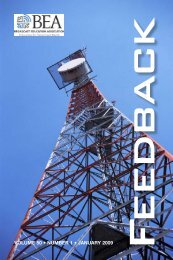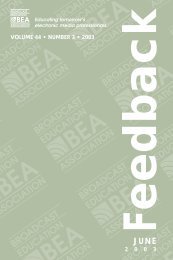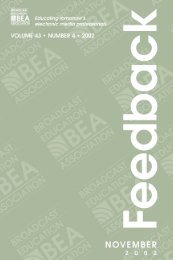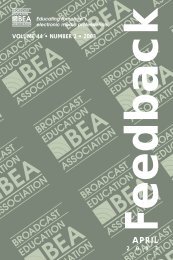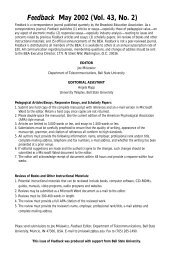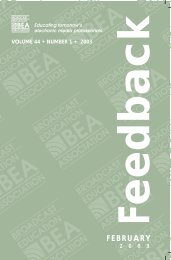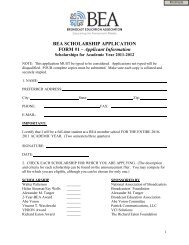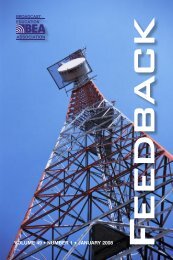PLANNING FOR GROWTH IN YEARS OF RESTRICTED RESOURCES
Feedback September 2003 - Broadcast Education Association
Feedback September 2003 - Broadcast Education Association
Create successful ePaper yourself
Turn your PDF publications into a flip-book with our unique Google optimized e-Paper software.
SCHOLARLY EDIT<strong>IN</strong>G <strong>IN</strong> THE DIGITALAGEKate Wittenberg, Columbia UniversityKW94@columbia.eduReprinted with permission from Chronicle of Higher Education,6/20/03 issue, page B12.ESSAYWhen the author of a new scholarly monograph talked about the publication process ata recent conference, she described the “collaborative team” that contributed insignificant ways to both the form and the content of her work. First she praised hereditor—for the design concept. Then she thanked the production manager and directorof technology—for their cogent editorial suggestions.What, exactly, is going on here? What has happened to traditional roles and divisionsin a publishing organization? And what does it mean for scholarly communication?The author was one of a small but growing group of scholars who are publishingelectronic works of history in the Gutenberg-e project through Columbia University’sElectronic Publishing Initiative. The project is an experiment in tapping the potentialof the digital environment to expand an author’s ability to create and disseminateinnovative scholarship, as well as an attempt to alter the landscape of the discipline ofhistory’s ability to accept that kind of work by its young scholars. Begun in 1999, withfinancing from the Andrew W. Mellon Foundation and under the auspices of theAmerican Historical Association, the project provides prizes to young scholars whosedissertations have been selected for publication in digital form.The first eight dissertations are now online at (http://www.gutenberg-e.org), andwhat they’ve taught us suggests that we publishers should start thinking about ourstaffing needs and our role in a new light.Book editors tend to see themselves working within a structure where authors writeas individuals, and where there are clear lines demarcating the editorial andproduction/design processes. Editors identify the best authors, provide various levels ofeditorial guidance, and work with authors to produce manuscripts that are, at somepoint, handed off to the production department. The emphasis is on what takes placebetween editor and author, not usually involving others.But consider the Gutenberg e-projects. First, the prize-winning authors gather for adaylong workshop with the project editor, designer, information technologist, andguests from scholarly publishing and digital libraries. The authors present their work;then they hear presentations from the project staff members. Afterward, they remain incontact with staff members as they proceed.Much has been written about the endangered status of the scholarly monograph inprint, but little, to my knowledge, about the evolving status of the editors of thoseworks. In their efforts to find answers to the problems of publishing specialized books,BEA—Educating tomorrow’s electronic media professionals 48



